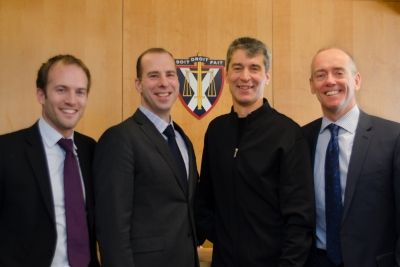
Professor Bruce Pardy recently invited two distinguished scholars to provide “scathing comments” about his new book so he could then argue they were “off their rockers.” Justice Grant Huscroft, Law’84, of the Ontario Court of Appeal and Professor Jason MacLean of Lakehead’s Faculty of Law took up the challenge on Jan. 18. They participated in a spirited but playful book launch for Ecolawgic: The Logic of Ecosystems and the Rule of Law. Students jam-packed the event, which gave them an engaging and humorous opportunity to think about law in a different way.
“Ecolawgic is about trying to change course,” said Pardy. “Its purpose is to question what we know to be true.”
The book’s main proposition is that laws designed to achieve social goals or to reflect moral truths actually reflect nothing but preferences. “That’s because the rightness of social goals and moral truths cannot be proven,” he said.
Pardy posited in his remarks that ecosystems and markets share important features: they arise spontaneously, are irresistibly neutral and obey their own innate rules. Government policies and legal regimes are not able to dictate how ecosystems and markets operate. However, ecosystems can provide insight about how the law should work. Legal decisions, he argued, should emanate from a system of governance. Isolated and instrumentalist legal commands are incompatible with the operation of law as a system.
Huscroft’s comments on the book were more complimentary than scathing. Ecolawgic, he stated “challenges orthodoxies and is provocative,” while at the same time is “fun to read and accessible.” He did, however, challenge Pardy’s main proposition, and stated his own view: “The inability to establish a right answer to a moral problem doesn’t mean there isn’t one.”
MacLean agreed with Huscroft that it was rare for an academic tome to be readable and accessible, but that Ecolawgic accomplished just that. However, MacLean didn’t agree with Pardy’s assertion that the idea of a “public interest” is a myth.
For students like Milan Vukovic, Law’17, the debate was lively and provided a new way in which to consider the law. “Events like Professor Pardy's book launch offer the community at the Faculty of Law the opportunity to both discover areas outside the legal curriculum and to critically evaluate the legal system itself. Oftentimes, students are so caught up with questions of how the law operates that they rarely have the time to ask why it operates so. Professor Pardy's talk provided us with the much-needed chance to challenge the very justifications for the legal system we study and ultimately live within.”
After the debate between the experts, students and faculty had an opportunity to ask questions and further probe into the issues that arose from the discussion.